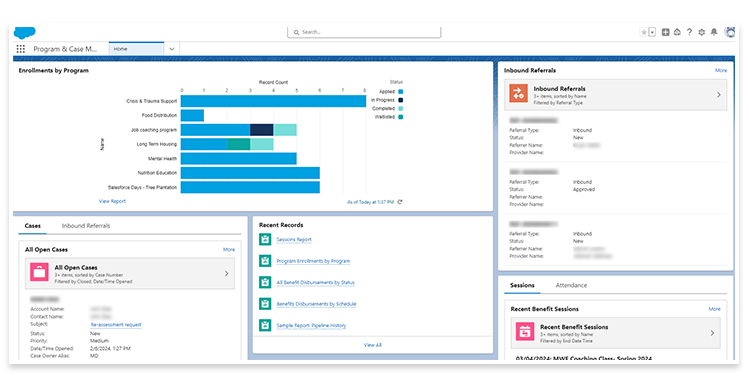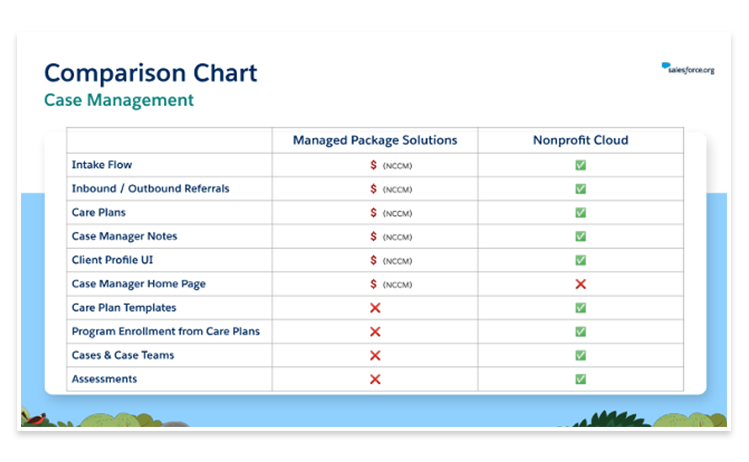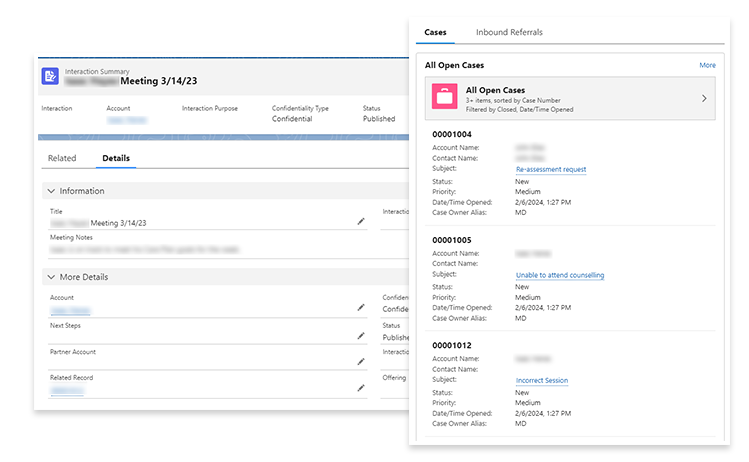Introduction to Salesforce Nonprofit Cloud
Salesforce Nonprofit Cloud is a specialized suite of applications developed by Salesforce, tailored specifically for nonprofit organizations. Key features and aspects of Salesforce Nonprofit Cloud include:
- Supporter relationship management
- Fundraising and donor management
- Grants management
- Outcome management
- Program and case management
- Marketing and engagement
- Reporting and analytics
Nonprofit Cloud adheres to the same high data security and compliance standards that companies trust around the world, which is crucial for nonprofits handling sensitive data.

This blog will focus on case management features, highlighting how they can transform client service and boost operational efficiency.
Key features of Salesforce Nonprofit Cloud Case Management
Each feature of Salesforce Nonprofit Cloud Case Management addresses specific needs within the nonprofit sector:
- Inbound referrals and intakes: This feature streamlines receiving and managing referrals from other organizations, ensuring a smooth and efficient entry point for clients. For instance, a homeless shelter could use this system to quickly onboard individuals referred by local hospitals or mental health clinics, ensuring they receive timely support and care.
- Dynamic assessments: With OmniScripts, nonprofits can conduct detailed and dynamic intake assessments and client evaluations. This capability is especially useful in organizations like counseling centers or educational programs, where individualized client information is crucial for developing personalized care plans.
- Case tracking: Allows for meticulous tracking of individual or family cases. A family services organization, for example, could use this to monitor the progress of each family unit, keeping track of counseling sessions, financial aid provided, or housing status updates.
- Care plans and templates: Enables organizations to create and customize care plans. A health clinic, for instance, could develop personalized health plans for patients, tracking treatment goals and outcomes over time.
- Interaction summaries: This feature is essential for documenting client meetings and interactions. In a legal aid nonprofit, case managers could record details from client consultations, ensuring all relevant information, like attendees and what the meeting was related to, is captured for case progression.
- Caseload complaints: Effectively manages incidents or issues with clients. For instance, in a disability services organization, administrators can track and resolve complaints about service delivery, enhancing accountability and client satisfaction.
- Experience Cloud portal: Built on the Salesforce platform, Experience Cloud allows for collaboration and communication with external communities. An educational nonprofit could use this for streamlined communication with volunteers, donors, and other stakeholders, ensuring effective coordination of activities and services.

Addressing real-world challenges with case management tools
Salesforce Nonprofit Cloud’s case management system is specifically designed to meet real-world challenges in the nonprofit sector and can be customized to meet unique needs:
- Personalized service delivery: Tailoring services to individuals by understanding and meeting unique client needs, ensuring impactful and relevant support.
- Streamlined operations: Reducing time spent on administrative tasks allows organizations to spend more time in the field or in practice than on paperwork.
- Data integration and accessibility: Nonprofits often struggle with scattered data across various systems. Case management in Salesforce Nonprofit Cloud can centralize data, making it easily accessible and actionable, crucial for informed decision-making.
- Client retention and engagement: By providing comprehensive client profiles and interaction histories, nonprofits can better understand and engage their clients, improving retention and satisfaction.
- Compliance and reporting: Nonprofits must adhere to various regulations and reporting requirements. Salesforce case management system can streamline compliance processes and simplify reporting, ensuring organizations stay accountable to stakeholders and regulatory bodies.
- Resource allocation and management: Efficiently managing limited resources is a constant challenge. The platform can help nonprofits analyze service demands and allocate resources more effectively, ensuring maximum impact.
- Collaboration across agencies: Nonprofits often collaborate with other agencies. Salesforce Nonprofit Cloud facilitates this collaboration, ensuring seamless information sharing and joint case management.

Salesforce Nonprofit Cloud’s case management features offer transformative solutions for nonprofits. Enhancing client service delivery and streamlining operations are invaluable assets for organizations looking to make a significant impact.


